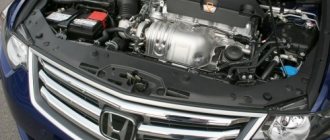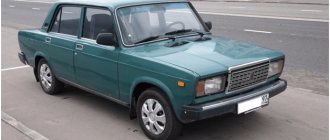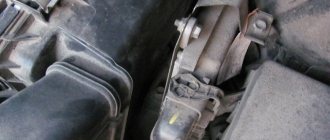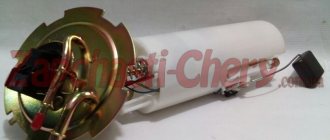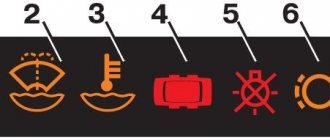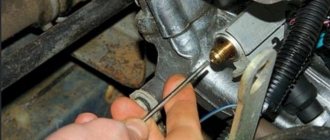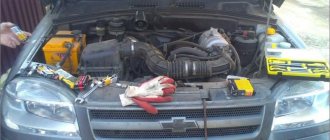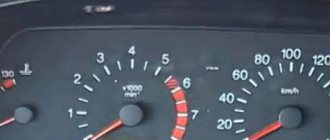What does “diesel gasoline engine” mean?
A special feature of diesel engine is the increase in engine operating noise. It is better to leave a car with such a breakdown in the garage; it is unsafe to drive it. Typically, diesel power indicates damage to the power unit, which is best eliminated at the time of its early manifestation. Otherwise, you will soon have to carry out major repairs.
Diesel engines make more noise than gasoline engines because their ignition system is designed in a special way. Dieselization of a gasoline engine is the appearance of noise characteristic of diesel engines. Usually noise appears when the engine is running cold or idling. There can be many reasons for this unpleasant phenomenon, but they are all related to the timing belt assembly.
Extraneous sounds due to timing belt faults
Timing problems can also cause a gasoline engine to operate like a diesel engine. Most often, the gas distribution mechanism begins to make obvious noise for two reasons:
The knocking of valves is clearly distinguishable against the general background and has a “metallic” ringing sound. This sound is localized in the cylinder head area, above the valve area. A knocking noise is clearly audible at low and medium crankshaft speeds. It is not recommended to drive for a long time with knocking valves, but getting to the service station on your own is quite possible.
Article on the topic: Car roof rack - install it yourself
As for the hydraulic compensators, their knocking is clearly distinguishable “when cold” and the sound resembles the operation of a well-warmed-up diesel engine. Hydraulic compensators may knock a little on a fully functional gasoline engine in the first minutes after starting, thus layering on the characteristic “clicking” sound of the operating injectors of an injection engine. With the onset of even slight warming up, the sound similar to the operation of a diesel engine should become less intense, and completely disappear at operating temperatures.
Why does a gasoline engine work like a diesel engine: reasons
Car manufacturers have always struggled to make engine operation silent. This also applies to domestic automakers. The engines of rear-wheel drive VAZs worked quietly at first, but after a certain mileage a loud noise appeared. To eliminate it, it was necessary to adjust the valves, because the “noisy” operation of the engine caused an increase in fuel consumption. The causes of noise were structural wear and metal expansion. I had to make manual adjustments every now and then.
But then timing belts with hydraulic compensators appeared, which made adjustments automatically. Thanks to this, the car drove silently for a long time. The mechanism required high-quality oil to operate, so synthetics were developed. However, diesel burnout still happens with modern engines. Let's look at the reasons for the phenomenon point by point.
Oil
This may seem trivial, but filling in “non-original” or, God forbid, counterfeit oil can cause the engine to growl. By the way, the problem can also appear when using high-quality working fluid - if it is not changed for a long time. You should not drive more than 20,000 km on one oil - this can completely “kill” the internal combustion engine. It is better to buy branded oil from trusted sellers.
Failure of hydraulic compensators is not such a rare occurrence. If they malfunction, noise appears in the area of the motor. This happens especially often with cars from Russian manufacturers.
Camshafts and valves
The valves eventually wear out their life, which leads to noise. Typically, breakdowns occur at the points of contact between the camshaft and valve mechanisms (cams, spots). But the defect also occurs due to high mileage - at least 200,000 km.
Shaft mount (pastel)
On some machines the pastel is initially slightly expanded. Because of this, engine operation may be accompanied by a strong roar. True, it is not always audible. When the metal is heated, it expands, which leads to a decrease in the gap and, accordingly, to the disappearance of noise. By the way, noise can occur on almost all cars with high mileage due to wear on the pastel mounting.
Valve train chain
A timing chain is more reliable than a belt drive, but it can also stretch. This is especially true for powerful TSI engines. The chain has tensioners, but if the chain is stretched too much, they become ineffective. Hence the rumble.
Timing belt
The belt itself cannot make noise, and it doesn’t stretch that often—it just breaks. But the belt tension system can make noise.
Valve system
Often a rumble appears after a major overhaul. The point is probably that the technician filled the valve mirror incorrectly - because of this, it cannot close normally, since there is an obstacle in its path. If the cylinder has low compression, this is most likely the problem.
Summarize
The most common reasons why a gasoline engine runs like a diesel are listed above. Other possible causes of a noisy gasoline engine include a failing cooling system, especially when the engine is unable to reach its operating temperature. In this case, the thermal clearances do not achieve optimal performance, resulting in increased noise levels. In addition, the problem may be faulty engine ECU or electrical circuits, timing drive, installation, etc.
What to do if the car accelerates worse, does not pick up speed, and malfunctions occur during acceleration. Why the engine does not pull, how to find the reason for the decrease in power.
How to fix the problem
Each specific case has its own algorithm of actions. If it is determined that the rumble is a consequence of using low-quality oil, you just need to switch to another fuel oil. It should be remembered that it is inadmissible to use oil without changing it for a long time. The same applies to broken hydraulic compensators, valves and camshafts.
The problem of a loose timing chain is easily solved - the chain needs to be tensioned. Although the chain can stretch so much that it is no longer possible to tighten it. Then the chain drive must be replaced. If a timing belt is used as a timing drive, it will also have to be changed, and this must be done together with the tension rollers. The problem with valves is also solved by replacing these elements.
To avoid engine diesel build-up, it is better to use only high-quality oil and change it more often - at least once every 10,000 km. It is the use of low-quality working fluid that causes an unpleasant rumble, similar to the noise of a diesel engine. In addition, it is important to use high-quality gasoline and constantly monitor the timing drive. The absence of a rumble similar to the noise of a diesel engine can only be guaranteed if these conditions are fully observed.
You can often hear such a phrase as “diesel engine” from drivers or old-school car mechanics. This is what they say when an additional sound is heard in the operation of a gasoline engine, similar to that produced by diesel engines. Gasoline engines are generally quieter than diesel engines, so this state of affairs can be called a malfunction. And if there is a breakdown, then it needs to be repaired. Diesel is often the first sign of more serious problems. In theory, everything is simple, but “dieseling” is a very subtle area where it is difficult to say anything categorically.
Extraneous sounds The main problem is that we write in words about a sound phenomenon. Ask two different people to describe “diesel” in words and they will have completely different descriptions, maybe they will give a completely different description. The sound is loud/quiet, soft/hard, clicking/gurgling - these characteristics cannot describe the entire gamut. It is not always clear what the problem is and where to look for it.
If you read the forums, it turns out that almost half of the drivers who complained about diesel engines had a different problem. The word is easy to hear, but not everyone has enough hearing to determine the exact sound.
In addition, some engines have design features that lead to noise. A few examples.
- Motors GM 1.4; 1.6 and 1.8 liters often begin to make noise as the mileage increases due to the characteristics of the phase shifters.
- The Volkswagen CFNA engine has a known bug with pistons knocking when cold.
Engine 1.6 CFNA
- The “Korean” Solaris and Rio injectors “chirp” very loudly during operation, which some owners consider a sign of a malfunction.
- In Logan with “mechanics”, at idle, a background rumble is clearly audible when the engine is running. And the reason is not even in the engine, just depress the clutch pedal and the rumble disappears - this is a feature of the release bearing, which is installed from the factory.
There are dozens and hundreds of such examples, we will not list them all. If you hear extraneous noise, rattling, rumble, tapping, or bubbling noises when the engine is running, search the Internet for something that applies specifically to your motor model. Perhaps this is a design feature that, although it does not paint the manufacturer, does not require immediate repair.
Design Features
Diesel engines, of course, do not have such colossal differences as the Wankel rotary piston engine, the design of which is absolutely not similar to the “anatomy” of a traditional internal combustion engine, but it has a number of features that draw a line between it and gasoline engines.
The diesel engine also has a crank mechanism, but its compression ratio is significantly higher - 19-24 units versus 9-11 units, respectively. The fundamental difference between a diesel engine and a gasoline engine is how the fuel-air mixture is formed, ignites and burns.
A diesel internal combustion engine does not have spark plugs and, accordingly, ignition of the fuel-air mixture occurs from compression. At the same time, air and diesel fuel are supplied separately. It should also be noted that almost no modern diesel engine can do without a supercharging system, which is used to improve the performance of the unit. Variable geometry turbochargers are used to optimize boost over the widest possible speed range. A diesel unit has a higher efficiency, but it is heavier and produces more torque at low speeds than a gasoline internal combustion engine.
Operating principle of a diesel engine
How does a diesel engine work and, most importantly, how does fuel ignite in the combustion chamber if this type of unit does not have spark plugs? First, air enters the cylinders. At the end of the compression stroke, when the piston has almost reached top dead center, the air temperature in the combustion chamber reaches high values (about 700-800 degrees) and then diesel fuel is injected into the cylinders, which ignites independently, without spark ignition. However, there are still spark plugs in a diesel unit, but they are glow plugs, not spark plugs, which heat the combustion chamber to make it easier to start the engine in cold weather.
Glow plug operation in a diesel engine
They are a spiral (there are metal and ceramic), can be installed in a vortex chamber or in a pre-chamber (if we are talking about units with a separate combustion chamber) or directly in the combustion chamber (if it is inseparable). When you turn on the ignition, the glow plugs almost instantly, in a matter of seconds, they heat up to temperatures in the region of a thousand degrees and heat the air in the combustion chamber, facilitating the process of self-ignition of the fuel-air mixture.
About the concept of “works like a diesel”
What is meant when it comes to running a gasoline engine like a diesel engine? As you know, a diesel engine is characterized by rougher operation and is characterized by knocking. This is explained by the fact that the mixture is ignited not by the spark plug, but by compression. A malfunction of a particular engine system can be identified by characteristic noises, knocking noises and the overall behavior of the engine. The problem can also be judged by the color of the exhaust gases. If you hear that a gasoline engine is unstable, knocks like a diesel engine, or troits, then the reasons may be the following:
As we can see, there are many options why a gasoline engine works like a diesel engine.
Fuel is not the only thing that can cause detonation. The reason may be a faulty knock sensor, as well as on a car with a manual transmission when driving in high gears at low speed. Another option is that quite dense carbon deposits have formed on the valves and in the combustion chambers. On engines where the OZ is set manually, detonation may also occur due to incorrect settings. As a result, the mixture burns out already on the exhaust stroke, while the engine runs roughly and with characteristic knocking noises. If fuel with a low octane number gets into the tank of your car, you can correct the situation by refueling with the appropriate gasoline or adding a special additive.
Types of diesel engines
Motors with a separate combustion chamber are widespread - fuel is injected into a special chamber in the block head above the cylinder and connected to it by a channel, and the combustion process does not occur exactly like in gasoline internal combustion engines. In this vortex chamber, the air flow swirls more intensely, which contributes to more efficient mixture formation and self-ignition, which continues in the main combustion chamber. By the way, diesel engines with a separate combustion chamber are less noisy due to the fact that the use of a vortex chamber reduces the intensity of pressure build-up during self-ignition.
In diesel engines with an undivided combustion chamber, the process of self-ignition occurs directly in the space above the piston. Units of this type are somewhat noisier.
The engine heats up and starts to stall: why does this happen?
Almost every car enthusiast sooner or later encounters such a fairly common malfunction of the internal combustion engine, when the engine stalls. As a rule, in certain situations the engine stalls when hot or only when cold, and tripping can also occur constantly (regardless of the temperature of the power unit, operating mode, load level, etc.).
In short, engine tripping means that one or more cylinders are not firing, and there can be several reasons for such a malfunction. In this article we will talk about why the engine stalls after warming up, how the malfunction can be diagnosed, and what signs help to accurately identify the problem.
Read in this article
What is Common Rail
Common Rail is a modern fuel injection system developed by Bosch and using the principle of supplying diesel fuel to the injectors from the fuel rail, which is a high-pressure accumulator. Common Rail allows you to make the unit quieter, while being more economical and environmentally friendly. Another advantage of using a common fuel rail is the wide range of possibilities for adjusting fuel pressure and injection timing, since these processes are separated.
The system includes a fuel injection pump (high pressure fuel pump), piezoelectric injectors, a fuel rail, a fuel pressure regulator and a fuel metering valve. It is interesting that at the dawn of their evolution, diesel units had much simpler fuel equipment with mechanical injectors and incomparably lower diesel pressure compared to modern systems.
Wear of ShPG parts
The connecting rod and piston group is subject to significant loads during engine operation. As long as the gaps between the rubbing surfaces do not exceed the permissible limits, a gasoline engine is much quieter than its diesel counterpart.
However, as the gaps increase as a result of natural wear and tear, metallic knocks of various types begin to superimpose on the pleasant rustling background. The gasoline engine operates almost like a diesel engine. Sources of knocking in the connecting rod and piston group:
Attention: when a knocking noise in the engine appears suddenly, you must stop driving and call a tow truck to get to the nearest auto repair service.
Source
Child of progress
Not so long ago, diesel engines were environmentally “dirty” and quite weak, but for some time now units of this type have changed dramatically, and some representatives of the tribe are worthy of sports cars. These include the BMW 3.0 liter inline six-cylinder engine with four turbochargers.
By the way, the design of this engine clearly demonstrates the progress of “heavy fuel” units. The technological masterpiece is equipped with two low-inertia low-pressure turbochargers and two more high-pressure ones, with one of them coming into action beyond 2500 rpm. Piezo injectors inject fuel under a colossal pressure of 2500 bar. Output – 400 hp. and 760 Nm. Interestingly, 450 Nm is available already at 1000 rpm! This is what modern diesel engines are like.
Subscribe to us on Facebook and Vkontakte!
You can often hear such a phrase as “diesel engine” from drivers or old-school car mechanics. This is what they say when an additional sound is heard in the operation of a gasoline engine, similar to that produced by diesel engines. Gasoline engines are generally quieter than diesel engines, so this state of affairs can be called a malfunction. And if there is a breakdown, then it needs to be repaired. Diesel is often the first sign of more serious problems. In theory, everything is simple, but “dieseling” is a very subtle area where it is difficult to say anything categorically.
In the photo: the engine from the inside
Extraneous sounds
The main problem is that we write in words about a sound phenomenon. Ask two different people to describe “diesel” in words and they will have completely different descriptions, maybe they will give a completely different description. The sound is loud/quiet, soft/hard, clicking/gurgling - these characteristics cannot describe the entire gamut. It is not always clear what the problem is and where to look for it.
If you read the forums, it turns out that almost half of the drivers who complained about diesel engines had a different problem . The word is easy to hear, but not everyone has enough hearing to determine the exact sound.
In addition, some engines have design features that lead to noise. A few examples.
1. Motors GM 1.4; 1.6 and 1.8 liters often begin to make noise as the mileage increases due to the characteristics of the phase shifters.
2. The Volkswagen CFNA engine has a known bug with pistons knocking when cold.
Engine 1.6 CFNA
3. The “Korean” Solaris and Rio injectors “chirp” very loudly during operation, which some owners consider a sign of a malfunction.
4. In Logan with “mechanics”, at idle, a background rumble is clearly audible when the engine is running. And the reason is not even in the engine, just depress the clutch pedal and the rumble disappears - this is a feature of the release bearing, which is installed from the factory.
There are dozens and hundreds of such examples, we will not list them all. If you hear extraneous noise, rattling, rumble, tapping, or bubbling noises when the engine is running, search the Internet for something that applies specifically to your motor model. Perhaps this is a design feature that, although it does not paint the manufacturer, does not require immediate repair.
Problems in the motor
If no widespread problems were noticed with a particular motor model, then you need to deal with a specific instance. We have compiled a list of common causes of diesel noise during operation. This is not a complete list, but it includes the most common points.
1. Gas distribution mechanism . Depending on the design of the mechanism, the problem can be in different elements, but often the cause is tensioners, both in the case of a chain and in the case of a belt. A stretched chain can also give a diesel sound, but a belt is rarely the cause; if it is worn out, it is more likely to break.
Stretched chain of BMW M57T2 engine
Repair in the timing system comes down to replacing problematic and expired elements.
2. Valves . “Excessive” sound from valves in an engine occurs even more often than from the timing belt, but usually it has a pronounced knocking sound and is not very similar to a diesel “rumbling”, but in some situations it can be confused. Valves knock either due to incorrect clearances or due to poor-quality repairs (poor “grinding”). Failed hydraulic compensators will also make knocking noises. Most often this occurs when it is cold, but not necessarily.
valves
3. Camshafts . Another popular reason. Usually the problem is in the bed, which either from the factory (this also happens) or simply due to wear has become a little wider than it should be. When starting such a motor, it may make a rumble. Sometimes this only happens when it’s cold, sometimes it always rumbles - it depends on the situation.
Camshaft output
4. Lubrication system . This is such a general point that includes a whole block of problems. Extraneous noise in engine operation can be caused by counterfeit oil, incorrectly selected oil (for example, too thin), poor operation of the oil pump, or a clogged oil receiver screen. Whatever it is, it’s all the same, the motor elements are not lubricated as they should be and rub against each other a lot, causing noise.
Let us remind you that these are only the most popular causes of diesel fuel. In simple situations, checking these four parameters should help; in more complex situations, the reason may be in a completely different area. In any case, it is better to consult with experienced mechanics - they will be able to determine the suspected cause by the shades of extraneous noise. And diagnosis based on descriptions of sounds is like treatment based on photographs.


